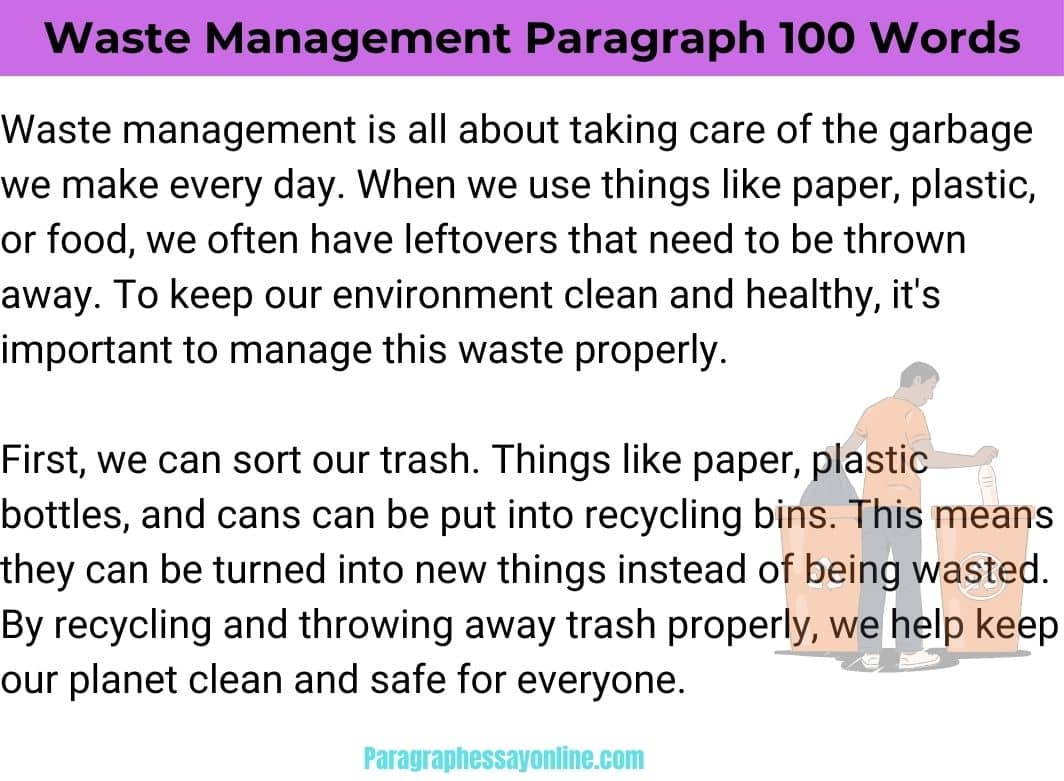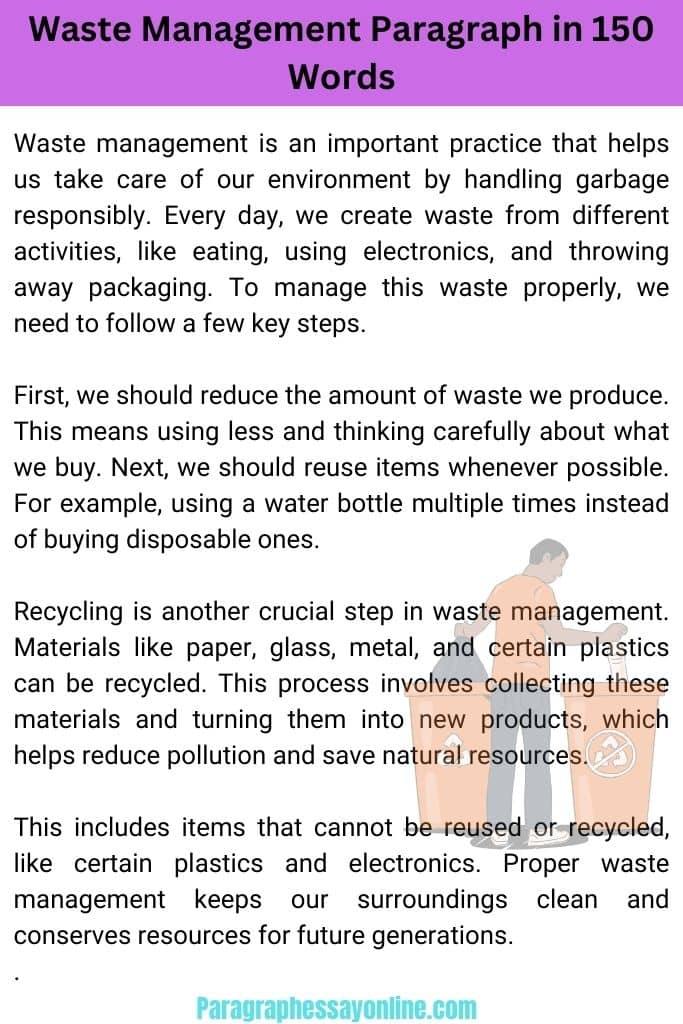Waste Management Paragraph
Waste Management Paragraph For All Classes (5-12)
Effective waste management is crucial for maintaining a clean and sustainable environment. It involves collection, transportation, disposal, and recycling of waste materials. Proper waste management practices help reduce pollution, conserve resources, and promote a healthier ecosystem for present and future generations.
Waste Management Paragraph 100 Words For 1, 2, 3 Students
Waste management is all about taking care of the garbage we make every day. When we use things like paper, plastic, or food, we often have leftovers that need to be thrown away. To keep our environment clean and healthy, it’s important to manage this waste properly.
First, we can sort our trash. Things like paper, plastic bottles, and cans can be put into recycling bins. This means they can be turned into new things instead of being wasted.
By recycling and throwing away trash properly, we help keep our planet clean and safe for everyone.

Paragraph On Waste Management in 150 Words For 4 & 5 Students
Waste management is an important practice that helps us take care of our environment by handling garbage responsibly. Every day, we create waste from different activities, like eating, using electronics, and throwing away packaging. To manage this waste properly, we need to follow a few key steps.
First, we should reduce the amount of waste we produce. This means using less and thinking carefully about what we buy. Next, we should reuse items whenever possible. For example, using a water bottle multiple times instead of buying disposable ones.
Recycling is another crucial step in waste management. Materials like paper, glass, metal, and certain plastics can be recycled. This process involves collecting these materials and turning them into new products, which helps reduce pollution and save natural resources.
This includes items that cannot be reused or recycled, like certain plastics and electronics. Proper waste management keeps our surroundings clean and conserves resources for future generations.

Waste Management Paragraph in 200 Words For 6, 7, and 8 Students
Waste management is essential for protecting our environment and conserving resources. It involves several practices like reducing, reusing, recycling, and safely disposing of waste. Reducing waste means creating less trash in the first place. For example, you can choose products with less packaging or use reusable bags and containers. Reusing involves finding new ways to use old items instead of throwing them away. For instance, turning jars into storage containers or using old clothes as cleaning rags.
Recycling is crucial because it processes used materials into new products, reducing the need for virgin materials and conserving energy. Items like paper, glass, metals, and some plastics are commonly recycled. It’s important to follow local recycling guidelines to ensure materials are properly sorted.
Finally, the proper disposal of waste that cannot be reused or recycled is vital. This includes hazardous waste, which should be handled specially to avoid harming the environment. Educating ourselves and participating in waste management programs in our communities can lead to effective waste reduction and help maintain a clean and healthy planet.
Paragraph On Waste Management in 250 Words For 8,9,10 Students
Effective waste management is crucial for environmental sustainability and involves more than just disposing of rubbish. It encompasses a series of actions aimed at reducing the impact of waste on the environment. The process starts with understanding the types of waste we produce, including organic, recyclable, and hazardous waste. Each type requires different management strategies.
Reducing waste is the most effective method and involves minimizing the amount of waste generated. This can be achieved by opting for products with minimal packaging, avoiding single-use items, and choosing reusable over disposable goods. Reusing items extends their life cycle, reducing the need to produce new products and the waste associated with them.
Recycling plays a significant role in waste management by turning materials that would otherwise become waste into valuable resources. However, proper sorting and contamination control are crucial for effective recycling. Materials such as paper, plastics, metals, and glass can often be recycled, but they must be clean and correctly sorted according to local recycling guidelines.
For waste that cannot be reused or recycled, proper disposal is essential. This includes not only everyday waste but also hazardous materials like electronics and batteries, which can leak harmful chemicals into the environment if not disposed of properly.
Educational initiatives and community participation are key in advancing waste management practices. By staying informed and involved, we can make choices that lead to better waste practices, less environmental impact, and a sustainable future for all.
Waste Management Paragraph 300 Words For 9, 10, 11, 12 Students
Waste management is a critical component of environmental conservation, impacting resource preservation and sustainability. It involves a series of well-coordinated actions aimed at reducing the environmental footprint of waste. The process includes the reduction, reuse, recycling, and responsible disposal of waste materials.
Starting with waste reduction, this strategy focuses on minimizing waste before it is even created. This can be achieved through smarter consumption practices, such as selecting products with less packaging, choosing durable over disposable items, and supporting products made from recycled materials. Reducing waste at the source not only lessens the load on landfills but also conserves natural resources and energy.
Reusing materials is the next line of defense in effective waste management. By finding new uses for old items, we extend their life and reduce the demand for new products. This could be as simple as using glass jars for storage or repurposing old clothing into other useful items like bags or quilts.
Recycling is vital in converting waste into useful materials, thereby preventing the depletion of more raw materials from the environment. It requires proper sorting and processing of recyclables like plastics, metals, paper, and glass. Technological advancements have made recycling more efficient, but it requires significant public participation and awareness to be fully effective.
Proper disposal, especially of hazardous and non-recyclable waste, is crucial to prevent environmental contamination. Special facilities exist for handling such waste, ensuring it doesn’t end up harming the ecosystem.
Education and policy play pivotal roles in shaping effective waste management practices. By integrating waste management into educational curriculums and creating strong policies that encourage waste reduction and recycling, societies can ensure sustainable practices are upheld. Additionally, community involvement in recycling programs and local waste management initiatives can significantly enhance the effectiveness of these practices, leading to a cleaner and more sustainable environment for future generations.
Waste Management Paragraph in 500 Words For All Students
Waste management is a comprehensive field that encompasses a range of activities aimed at efficiently handling the waste generated by human activities, with the ultimate goal of reducing its impact on the environment. As students in grades 9 through 12, understanding the complexities of waste management can help you appreciate the importance of sustainability and your role in preserving the environment.
The concept of waste management is built on the principles of reduce, reuse, recycle, and recover. Each of these plays a critical role in the waste hierarchy, which aims to minimize the amount of waste sent to landfills and promote a more sustainable interaction with our natural resources.
Reduction is the most effective strategy in waste management. It involves altering patterns of production and consumption to prevent waste creation. This can be achieved through actions such as choosing products with minimal or no packaging, opting for sustainable products, and reducing energy consumption. Reduction not only lessens the strain on waste disposal systems but also conserves resources and reduces pollution.
Reuse involves finding new uses for old items rather than discarding them. This can significantly extend the lifecycle of products and materials, thereby reducing the demand for new products and the environmental burden of production and waste disposal. Examples include using second-hand products, repairing broken items, and repurposing materials for different uses.
Recycling turns materials that would otherwise become waste into valuable resources. It requires sorting waste into different categories such as paper, plastics, metals, and glass. Effective recycling also involves understanding the specific recycling rules of your community to prevent contamination of recyclables, which can render them unusable. Recycling helps conserve natural resources, reduces energy consumption, and decreases greenhouse gas emissions.
Recovery is another aspect of waste management, focusing on converting waste into energy or recovering resources through methods such as anaerobic digestion, incineration, and composting. These processes help reduce the volume of waste, produce energy, and return nutrients to the soil, thereby supporting a circular economy.
Proper disposal of waste, particularly hazardous waste, is crucial. Items like batteries, electronics, and chemicals need special handling to prevent them from polluting the environment. Secure landfills and special treatment facilities are designed to safely contain and neutralize these dangerous wastes.
Education and innovation are key drivers in advancing waste management practices. As students, you can engage in educational programs and initiatives that promote sustainable practices. Schools can integrate waste management into the curriculum to foster a generation that is conscious of its environmental responsibilities.
Community involvement is also vital. Participating in local clean-up drives, recycling programs, and waste reduction campaigns can have a significant impact. Moreover, advocating for policies that support environmental sustainability can lead to broader changes in how communities handle waste.
Finally, technology plays a transformative role in waste management. Innovations in recycling technologies, waste sorting, and biological treatment processes are continually improving the efficiency of waste management systems. Staying informed about these advancements can empower you to make better choices and encourage others to do the same.
You as students can play a crucial role in shaping a sustainable future, ensuring that we minimize our ecological footprint and conserve our planet for future generations.
Most Important Paragraph:
| Tree Paragraph. |
| Greenhouse Effect Paragraph. |
| English Speaking Paragraph. |
| Tree Plantation Paragraph. |
| Eid Day Paragraph. |
Frequently Asked Questions on Waste Management Paragraph
Why is waste management important?
Waste management is important because it helps reduce pollution, conserve natural resources, prevent the spread of diseases, and create a cleaner and healthier environment.
What are the different types of waste?
The main types of waste include municipal solid waste, industrial waste, hazardous waste, medical waste, and electronic waste.
How can individuals contribute to effective waste management?
Individuals can contribute to effective waste management by reducing waste, reusing items, recycling, composting organic waste, and disposing of hazardous materials properly.
What are the benefits of recycling?
The benefits of recycling include reducing waste, conserving natural resources, saving energy, creating jobs, and reducing greenhouse gas emissions.
How can waste management help combat climate change?
Waste management can help combat climate change by reducing methane emissions from landfills, conserving energy, and promoting the use of renewable resources.
What are the challenges in implementing effective waste management systems?
Some challenges in implementing effective waste management systems include lack of infrastructure, limited funding, lack of public awareness, and improper disposal of hazardous waste.
